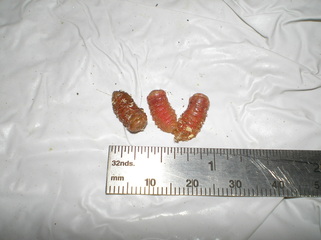 small strongyle
small strongyle
Read on if you dare...
STRONGYLES
There are over 40 different species of parasites that infect horses. Here are some facts on only some of the parasites horses can harbor. Only a few species pose serious problems. This is why it's important to deworm your horse at least once or twice a year even with low egg counts to keep these other nasties in check. The most common parasite is the strongyle. There are large and small specific species. Large strongyles have mostly been eradicated, small strongyles are still a problem. This species is what shows up in a FEC 99.9% of the time. Egg counts are based on number of eggs per gram of fecal matter. 0-200 is low, 200-500 moderate, 500+ high. Deworming is suggested in the moderate range. A small colony of parasites stimulate the horses immune system to keep parasites in check. Small strongyles stay in the digestive tract as opposed to other parasites that migrate to other organs.
STRONGYLES
There are over 40 different species of parasites that infect horses. Here are some facts on only some of the parasites horses can harbor. Only a few species pose serious problems. This is why it's important to deworm your horse at least once or twice a year even with low egg counts to keep these other nasties in check. The most common parasite is the strongyle. There are large and small specific species. Large strongyles have mostly been eradicated, small strongyles are still a problem. This species is what shows up in a FEC 99.9% of the time. Egg counts are based on number of eggs per gram of fecal matter. 0-200 is low, 200-500 moderate, 500+ high. Deworming is suggested in the moderate range. A small colony of parasites stimulate the horses immune system to keep parasites in check. Small strongyles stay in the digestive tract as opposed to other parasites that migrate to other organs.
BOTS
Bots are those pesky bee like insects that lay tiny eggs on your horses legs, neck and face. They are in the gasterophilus family. Adults live about 2 weeks and have no mouth! Females can lay up to 1000 eggs per life cycle. It all begins when your horse, troubled by other flies buzzing and landing on their legs, gets a bot egg in their mouth. Most likely from scratching their leg with their mouth. In a few days the egg nestled in some crevice in your horses tongue hatches. It then migrates to spaces between your horses molars and hangs out and gets bigger and irritating for about a month. Then it's off to the stomach to irritate some more. It attaches itself there and stays there, growing for anywhere from 7 months to a year. It emerges and makes it's way to the bottom of the dung pile, burrowing into the soil to finish morphing into that pesky bot fly. A fecal egg count will not tell you if your horse has bots as the eggs are on the outside of your horse (duh) It is important to remove those eggs daily. Horses on pasture seem to get more bot eggs on them than horses in the stable. Ask your vet about when and which deworming drug to use. Your horse will thank you.
Bots are those pesky bee like insects that lay tiny eggs on your horses legs, neck and face. They are in the gasterophilus family. Adults live about 2 weeks and have no mouth! Females can lay up to 1000 eggs per life cycle. It all begins when your horse, troubled by other flies buzzing and landing on their legs, gets a bot egg in their mouth. Most likely from scratching their leg with their mouth. In a few days the egg nestled in some crevice in your horses tongue hatches. It then migrates to spaces between your horses molars and hangs out and gets bigger and irritating for about a month. Then it's off to the stomach to irritate some more. It attaches itself there and stays there, growing for anywhere from 7 months to a year. It emerges and makes it's way to the bottom of the dung pile, burrowing into the soil to finish morphing into that pesky bot fly. A fecal egg count will not tell you if your horse has bots as the eggs are on the outside of your horse (duh) It is important to remove those eggs daily. Horses on pasture seem to get more bot eggs on them than horses in the stable. Ask your vet about when and which deworming drug to use. Your horse will thank you.

